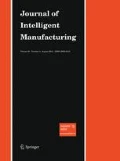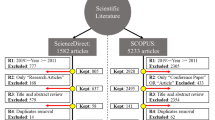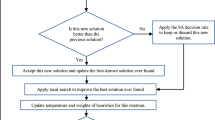Abstract
This study presents a framework for solving the multi-period, multi-product and multi-resource production-scheduling (M3PS) problem. Practically, the main concern for an M3PS problem is how to satisfy two management policies: (1) each product is manufactured in a continuous manner so that once the product is on a production line, it will complete its production procedure without interruption, and (2) the number of the product's types is limited during one period. By defining the decision variables and taking into account the machine's capacity and the customers' demand, a mixed integer programming (MIP) Model is formulated. To solve this MIP problem, a two-phase approach is proposed. In phase 1, the search space of the MIP Model is transformed into a preliminary pattern by a heuristic mining algorithm so that a hyper assignment problem can be formed as a reference model to be solved. In phase 2, a stochastic global optimization procedure that incorporates a genetic algorithm with neighborhood search techniques is designed to obtain the optimal solution. A numerical experiment is presented with an illustration, and it shows that the proposed model is adequate to cope with complicate scheduling problems.
Similar content being viewed by others
References
Artiba, A. and Elmaghraby, S. E. (1997) The Planning and Scheduling of Production Systems, Chapman & Hall, London.
Bahl, H. C., Ritzman, L. P. and Gupta, J. N. D. (1987) Determining lot sizes and resource requirements: A review. Operations Research, 35(5), 329-345.
Carvalho, M. F., Fernandes, C. A. O. and Ferreira, P. A. V. (1999) Multiproduct multistage production scheduling (MMPS) for manufacturing systems. Production Planning & Control, 10(7), 671-681.
Chu, P. C. and Beasley, J. E. (1997) A genetic algorithm for the generalized assignment problem. Computers and Operations Research, 24(1), 17-23.
Chu, S. C. K. (1995) A mathematical programming approach towards optimized master production scheduling. International Journal of Production Economics, 38, 269-279.
Goldberg, D. E. (1989) Genetic algorithms in search optimization and machine learning, Addison-Wesley, MA.
Holland, J. H. (1975). Adaptation in Natural and Artificial Systems, 2nd Edn, University of Michigan Press, MIT Press, 1992.
Houck, C. R., Joines, J. A. and Kay, M. G. (1996) Comparison of genetic algorithms, random restart, and two-opt switching for solving large location-allocation problems. Computers and Operations Research, 23(6), 587-596.
ILOG (1997) Using the CPLEX Callable Library, ILOG CPLEX Division.
Morton, T. E. and Pentico, D. W. (1993) Heuristic Scheduling Systems, John Wiley & Sons, New York, USA.
Murata, T., Ishibuchi, H. and Tanaka, H. (1996) Genetic algorithms for flowshop scheduling problems. Computers and Industrial Engineering, 30(4), 1061-1071.
Onwubolu, G. C. and Mutingi, M. (1999) Genetic algorithm for minimizing tardiness in flow-shop scheduling. Production Planning & Control, 10(5), 462-471.
Pinedo, M. and Chao, X. (1999) Operations Scheduling with Applications in Manufacturing and Services, McGraw-Hill, Singapore.
Ramachandran, B. and Pekny, J. F. (1998) Lower bounds for nonlinear assignment problems using many body interactions. European Journal of Operational Research, 105, 202-215.
Rardin, R. L. (1998) Optimization in Operations Research, Prentice-Hall, NJ.
Renders, J.-M. and Flasse, S. (1996) Hybrid methods using genetic algorithms for global optimization. IEEE Transactions on Systems, Man, and Cybernetics Part B, 26(2), 243-258.
Roy, R. and Meikle, S. E. (1995) The role of discrete event simulation techniques in finite capacity scheduling. Journal of the Operational Research Society, 46, 1310-1321.
Tang, L., Liu, J., Rong, A. and Tang, Z. (2000) A mathematical programming model for scheduling steelmaking-continuous casting production. European Journal of Operational Research, 120, 423-435.
Tate, D. M. and Smith, A. E. (1995) A genetic approach to the quadratic assignment problem. Computers and Operations Research, 22(1), 73-83.
Van Roy, T. J. and Wolsey, L. A. (1987) Solving mixed integer programming problems using automatic reformulation. Operations Research, 35(1), 45-57.
Vavasis, S. (1991) Nonlinear Optimization: Complexity Issues, Oxford University Press, New York, USA.
Wang, H. F. and Wu, K. Y. (2001) Hybrid genetic algorithm for models with permutation property. Submitted to Computers and Operations Research.
Weinstein, L. and Chung, C. H. (1999) Integrating maintenance and production decisions in a hierarchical production planning environment. Computers and Operations Research, 26, 1059-1074.
Wu, K. Y., Wang, H. F., Huang, C. and Chi, C. (2000) Multi-period, multi-product production scheduling\3-a case of LED manufacturing system. Proceedings of the 5th Annual International Conference on Industrial Engineering, Taiwan.
Author information
Authors and Affiliations
Corresponding author
Rights and permissions
About this article
Cite this article
Wang, Hf., Wu, Ky. Modeling and analysis for multi-period, multi-product and multi-resource production scheduling. Journal of Intelligent Manufacturing 14, 297–309 (2003). https://doi.org/10.1023/A:1024645608673
Issue Date:
DOI: https://doi.org/10.1023/A:1024645608673




